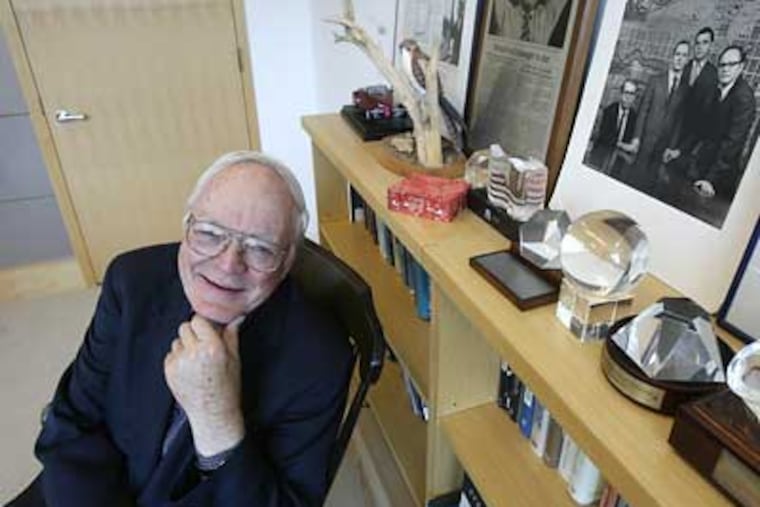Former Vanguard guru is buying stocks
In a small office in West Conshohocken, a legendary stock market bottom feeder has been having a feast. John B. Neff, who racked up record gains as manager of Vanguard's Windsor Fund over three decades, is buying stocks again.

In a small office in West Conshohocken, a legendary stock market bottom feeder has been having a feast.
John B. Neff, who racked up record gains as manager of Vanguard's Windsor Fund over three decades, is buying stocks again.
And while the actions of one person may mean little in a multitrillion-dollar market, Neff's renewed romance with stocks signals that, to him, the worst is over.
As of Friday, he has put cash that he had held on the sidelines for the last year back into the stock market. He retired from Windsor in 1995, after 31 years, so the world no longer watches him. He manages a portfolio for himself and for some small charities.
But at age 77, he has not tired of what he calls "the ultimate ball game," the stock market.
About 18 months ago, Neff started to keep more of the stock portion of his portfolio in cash. (He noted that since he left Windsor, he has kept about 30 percent of his portfolio in tax-free municipal funds to preserve wealth.)
Neff likes bargains, stocks that sell for prices of five or six times their earnings. It is like shopping only when prices are marked down 60 percent or more.
Few stocks were that cheap last year, so he sold some of his investments to take gains and did not reinvest. For much of the last year, he has had about 15 percent to 20 percent of his stock portfolio in cash.
It is not that he saw the downturn coming.
"I wasn't greatly concerned about the level of the market, or I would have had more than 15 percent in cash," he said. "I was just having a tough time finding the kind of stuff I like, with a low P/E [price-to-earnings] ratio and a high dividend yield."
Like a P/E, a dividend yield, calculated by dividing dividends paid yearly by the stock price, may indicate whether a stock is a bargain.
So does it mean anything that he has put his cash back in the game?
"It does," he said. "It says in fact that an awful lot of things are available at a friendly price. It's the kind of market I'd take advantage of."
He is not completely bullish.
"There's some real tough sledding out there," he said. He said he believed that the economy might experience a recession but that he thought it would be mild because retailers were marking down prices and consumers would buy.
And before anyone even considers following his investing lead, he cautions that he "really got killed the last couple of weeks."
Last year, his portfolio lost about 11 percent, although the overall market was up slightly. But since he left Windsor, he said, he has earned about 19 percent yearly, far better than the overall market. In the 31 years he oversaw Windsor, he beat the Standard & Poor's 500 index 22 times - by about 3.5 percentage points a year.
As Windsor manager, he was a maverick. (Neff, a lifelong Republican, is supporting John McCain for president.) Conventional investing wisdom says people should diversify, buying many stocks to reduce the risk of losing a lot on one. Neff liked to make big bets - and still does.
His current portfolio contains about seven stocks. His on-again, off-again love affair with banking giant Citigroup Inc. is on again. He famously bought a big stake in that company for Windsor in the early 1990s when bad loans in real estate and in developing countries pummeled its shares.
He has been buying Citigroup again, believing that its stellar network of offices around the world will help it thrive when the global economy recovers. Citigroup now accounts for about 13 percent of his portfolio.
He also likes Seagate Technology Inc., which makes hard-disk drives. Neff said he thought that business would continue to grow as corporations sought computer storage.
He also likes energy companies ConocoPhillips and Swift Energy Co. and computer-maker Hewlett-Packard Co.
Several of his positions remain underwater, but he has regained some of that ground in the last two days.
"Citigroup is up 18 percent today," he said after yesterday's market close. He still has a long way to go. Citigroup shares closed at $18.62 yesterday. He paid about $45 a share for previous Citigroup purchases.
So he continues to toil, almost as hard as he did when he was managing billions of other people's money. He works about 60 hours a week in the West Conshohocken office offered to him by his friend Paul Miller, a founder of the money management firm Miller, Anderson & Sherrerd that later became part of Morgan Stanley.
Neff said he remained a product of his youth in the Midwest and in Texas.
"I'm a combination of Michigan substance and Texas bull," he said. By bull, he said, he means that he has strong opinions and few fears about expressing them.
His opinions remain strong, but his body has faltered a bit. He has retired from various boards of directors. He tires more easily than he used to and dislikes the harried nature of today's business travel. He says he is occasionally forgetful and confesses to requiring a short midafternoon nap.
"It's just a little hard to keep up. I still keep up with the marketplace, I think."